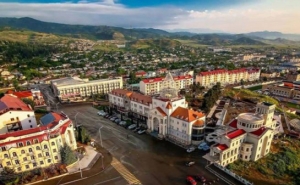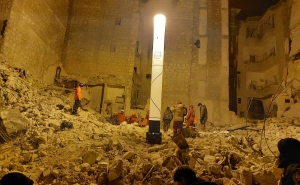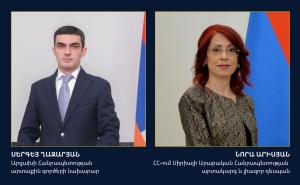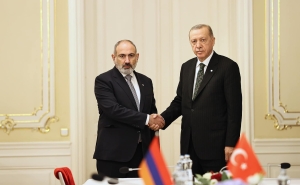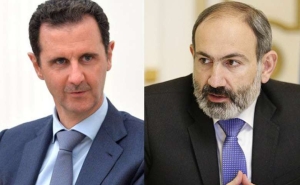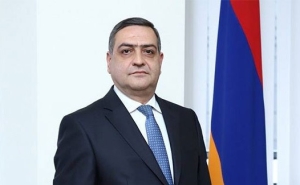 Russia, Iran, Turkey Consistently Carry Out Their Aims in Syria
Russia, Iran, Turkey Consistently Carry Out Their Aims in Syria

The fourth round of the Syrian talks in Astana on May 3-4 ended with substantial results. Unlike the previous round, the opposition delegation took part in negotiations, but they failed to achieve any progress in talks between the delegations of the Syrian government and the opposition. The main result of the negotiations was the signing of a Memorandum between the mediator countries of Astana talks – Russia, Iran and Turkey – on creating the so-called "de-escalation zones" in Syria. It should be noted that the delegations of the Syrian government and opposition did not sign the document, but according to the Russian side they accepted it (except for a number of opposition representatives).
Trilateral deal between Russia, Iran and Turkey
The deal comes into force from May 6. De-escalation zones will be established for a 6-month period and then the memorandum can be extended for another 6 months or for an unspecified period of time in case there is no other decision by the mediator states. According to TASS, 4 de-escalation zones will include Idlib province and several regions from the neighboring provinces (Aleppo, Latakia, Hama), the regions that are located in the north of Homs, Eastern Ghuta suburb in Damascus and several regions in the southern Syria – Daraa and All-Quneitra. The number of the de-escalation zones can increase.
Along with ending military actions in these zones, the flights of the military aviation (among them Syrian and American) are banned as well. The de-escalation zones will be controlled by the guarantor states’ (Russia, Iran, Turkey) forces.
The official aim of the project is to separate opposition forces from the terrorist groups, to strengthen the ceasefire regime and prevent further accidents (although the project does not spread throughout the country at this stage). The guarantor states hope the implementation of the project will create a basis for political talks.
Russia agreed not only with Turkey and Iran, but also with the US
The Russian project of creating de-escalation zones in Syria (according to some sources, the project is being implemented by the personal orders of the Russian President) is a new approach and it seems Moscow managed to come to an agreement not only with Turkey and Iran, but also with another major player of the Syrian conflict – the United States. Particularly, Vladimir Putin after the talks with his Turkish counterpart said he had discussed the idea of creating such zones in Syria with the President of the US and he is quite positive about the idea. Besides that the US for the first time sent Stuart Jones, Assistant Secretary of State for the Near East Affairs to take part in Astana talks on May 3-4 (before that, the US was presented by the American Ambassador in Kazakhstan). Thus, it can be assumed that there is a certain consensus between these states.
Any agreement on Syria is too fragile
Of course, one should take into consideration that any such agreement on Syria is too fragile. There are numerous disagreements inside the Russia-Iran-Turkey axis, besides, in order to implement the project of creating de-escalation zones in Syria the consent of other key players of the Syrian conflict is needed that is quite problematic. One cannot ignore the danger of terrorist groups in Syria as well (especially the ones that are out of control). There are also many complaints among the oppositional delegation in Astana that will create additional obstacles for the implementation of this project.
Countries of Russia-Iran-Turkey axis strengthen their positions in Syria
The fact that the de-escalation zones will be controlled by the guarantor states among other factors lets us suggest that the project aims at further strengthening the positions of Russia, Turkey and Iran in Syria (the same goal was achieving the idea of Syrian negotiations in Astana along with talks in Geneva). Syria is, in fact, divided into zones of influence and this project tries to somehow legitimize the current situation in the country.
Finally, if the de-escalation zones foresee creation of "safe zones" in Turkish perception, then it may be a serious blow to the Syrian state, creating a basis for further fragmentation of the country.
Other materials on this subject
- Turkey Is Ready For a New Military Operation in Northern Syria Kalyn said. He also added that in the event of a threat, ''an assessment will be made and everything necessary will be done.''
- Russia, Iran and Turkey Discussed the Turkish Operation in Syria Russian side tried to convince Ankara to solve the problem by peaceful means, without resorting to violence.
- US Forces in Syria Attacked after Air rRids on Armed Groups Iran-backed armed groups had earlier promised to retaliate after the US launched several air raids on the groups in Iraq and Syria on Sunday.
- Syria: Assad's Baath Party Wins Majority in Parliamentary Polls More than 7,000 polling stations were set up across government-controlled parts of the country. Voting also took place in former opposition-held areas for the time since government forces retook much of...
- Russia, China Veto U.N. Approval of Aid Deliveries to Syria from Turkey The Security Council will now vote on a rival Russian text that would only approve one Turkish crossing for aid access for six months. During the coronavirus pandemic the council has been operating virtually,...
-
 17:08
17:08The regular session of the Anti-corruption Policy Council takes place in Jermuk
-
 15:05
15:05The Prime Minister sends congratulatory messages to the supreme leader of Iran and the President of Iran
-
 11:11
11:11Armenia sends earthquake aid to Turkey
-
 10:43
10:43Commemoration of the Pontiff St. Sahak Partev
-
 09:16
09:16Some roads are closed and difficult to pass in Armenia
-
 19:55
19:55Phone conversation of the Foreign Minister of Armenia with the U.S. Assistant Secretary of State for European and Eurasian Affairs
-
 18:30
18:30Prime Minister Pashinyan and President Khachaturyan meet
-
 18:20
18:20Ararat Mirzoyan with Co-Chairman of the OSCE Minsk Group of France Brice Roquefeuil
-
 17:01
17:01Humans could land on Mars within 10 years, Musk predicts
-
 16:45
16:45France, US urge 'immediate' end to Nagorno Karabakh blockade
-
 16:01
16:01Blockaded Nagorno Karabakh launches fundraiser to support quake-hit Syria
-
 15:59
15:59Earthquake death toll in Turkey rises to 18,342
-
 15:43
15:43Ararat Mirzoyan Held a Telephone Conversation with Sergey Lavrov
-
 15:06
15:06French president rules out fighter jet supplies to Ukraine in near future
-
 14:47
14:475 Day Weather Forecast in Armenia
-
 14:44
14:44President Vahagn Khachaturyan wrote a note in the book of condolences opened in the Embassy of Syria in Armenia
-
 14:20
14:20Azerbaijan’s provocations impede establishment of peace and stability – Armenian FM tells Russian Co-Chair of OSCE MG
-
 12:57
12:57France representation to OSCE: Paris calls on Azerbaijan to restore freedom of movement through Lachin corridor
-
 11:40
11:40Command of Kosovo forces highly appreciated preparation of Armenian peacekeepers
-
 10:16
10:16The United States withdrew from sanctions against Syria for six months the provision of assistance after the earthquake
day
week
month
Humidity: %
Wind: km/h


